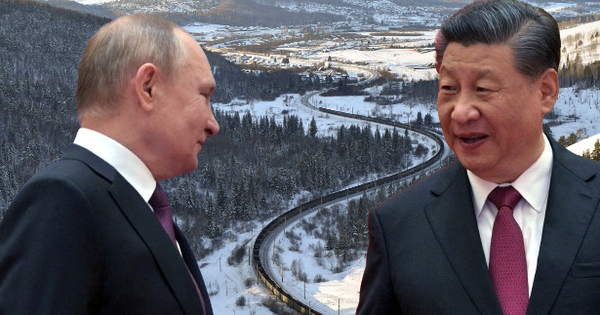Russian Railways Upgrade to Strengthen Trade with China

Image Source: Getty
The Russian President, Vladimir Putin, has called for increased transportation capabilities on the Trans-Siberian and Baikal-Amur Mainline, the two railway lines that connect Russia to China in the south. Bloomberg reports that around $4 billion is expected to be allocated for railway infrastructure upgrades, with investments for the future potentially approved this month.
This move highlights the strengthening relationship between the two nations. At a press conference last week during the “Two Sessions” meetings, the Chinese Foreign Minister, Wang Yi, stated, “China and Russia have established a new model for relations between major powers.”
Wang Yi also remarked, “The mutual political trust between the two countries continues to deepen. Russian natural gas is reaching Chinese households, while Chinese cars are running on Russian streets.”
The focus on railway improvements may also be a response to the increasing difficulties faced by Russia in its maritime trade routes. Western sanctions have progressively limited Russia’s efforts to export crude oil and other goods through its sea routes.
In recent months, the Group of Seven (G7) industrialized nations has imposed stricter price limits on Russian oil, resulting in sanctions against 50 oil tankers in early February.
This tighter approach from the West has had negative implications for Russia’s trade with other key markets. For example, Indian oil refineries have shown readiness to reduce their purchases from Russia, despite India becoming Russia’s largest buyer of crude oil via sea routes by 2023.
Bloomberg reports that the Russian Energy Ministry is prioritizing oil transportation by rail. This year may also see more detailed information regarding the construction of two new railway lines with China until 2030, alongside the existing four lines.
Investing in upgrades is necessary due to the increasing logistical challenges faced by Russian railways. In 2023, the country’s railway system transported less than 13% of its capacity, with congestion being a regular occurrence even before the conflict in Ukraine escalated, doubling the demand for transportation.
The planned enhancements are expected to increase the transportation capacity on the Trans-Siberian and Baikal-Amur Mainline to 210 million tons by 2030, compared to 150.5 million tons in 2023.
Strong Development in Sino-Russian Trade
The latest trade figures released by the Chinese Customs on March 8 showed robust growth in trade between China and Russia, with a total value of $37 billion in January and February of this year.
This includes $16.8 billion in Chinese exports to Russia (a 12.5% increase) and $20.2 billion in imports from the northern neighbor (a 6.7% increase), resulting in a 9.3% year-on-year growth in total bilateral trade.
This growth rate surpasses that of China’s trade with most other countries. Only India and Canada have achieved higher rates of bilateral trade growth with China, at 15.8% and 10.4%, respectively.
In contrast, exports to China’s largest trading partner, the United States, decreased by 5%, while imports from the US to China dropped by nearly 10%.
George Magnus, an economist and former Chief Economist of UBS (Switzerland) and current Associate at the China Centre at the University of Oxford (UK), stated, “The increasing volume of exports to Russia is definitely part of a trend in which Sino-Russian trade is replacing other trade relationships and reflects a growing integration.”
According to Newsweek, China has effectively helped Russia mitigate the impact of sanctions by strengthening the economic relationship, providing alternative currencies for transactions, and compensating for losses in gas and oil orders from the West.
This cooperative relationship has become increasingly important as Western countries impose economic and financial sanctions on Russia in response to its military campaign in Ukraine, which has now entered its third year.
Business Today

